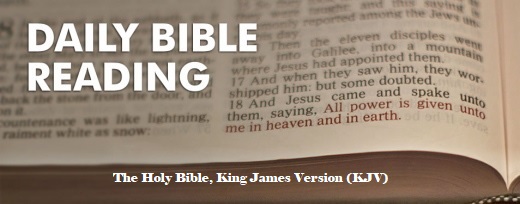The Daily Readings
TUESDAY, September 22, 2020
Psalm 119:97-104; Numbers 11:1-9; Romans 16:17-20
The Holy Bible, King James Version (KJV)
Today’s Verse-of-the-Day: Romans 15:7
Wherefore receive ye one another, as Christ also received us to the glory of God.
Today’s Readings:
God’s word sweeter than honey
Commentary97 O how love I thy law! it is my meditation all the day.
What we love, we love to think of. All true wisdom is from God. A good man carries his Bible with him, if not in his hands, yet in his head and in his heart. By meditation on God's testimonies we understand more than our teachers, when we understand our own hearts. The written word is a more sure guide to heaven, than all the fathers, the teachers, and ancients of the church. We cannot, with any comfort or boldness, attend God in holy duties, while under guilt, or in any by-way. It was Divine grace in his heart, that enabled the psalmist to receive these instructions. The soul has its tastes as well as the body. Our relish for the word of God will be greatest, when that for the world and the flesh is least. The way of sin is a wrong way; and the more understanding we get by the precepts of God, the more rooted will be our hatred of sin; and the more ready we are in the Scriptures, the better furnished we are with answers to temptation.
98 Thou through thy commandments hast made me wiser than mine enemies: for they are ever with me.
99 I have more understanding than all my teachers: for thy testimonies are my meditation.
100 I understand more than the ancients, because I keep thy precepts.
101 I have refrained my feet from every evil way, that I might keep thy word.
102 I have not departed from thy judgments: for thou hast taught me.
103 How sweet are thy words unto my taste! yea, sweeter than honey to my mouth!
104 Through thy precepts I get understanding: therefore I hate every false way.
Complaints about manna
Commentary11:1 And when the people complained, it displeased the Lord: and the Lord heard it; and his anger was kindled; and the fire of the Lord burnt among them, and consumed them that were in the uttermost parts of the camp.
Verses 1-3 — Here is the people's sin; they complained. See the sinfulness of sin, which takes occasion from the commandment to be provoking. The weakness of the law discovered sin, but could not destroy it; checked, but could not conquer it. They complained. Those who are of a discontented spirit, will always find something to quarrel or fret about, though the circumstances of their outward condition be ever so favourable. The Lord heard it, though Moses did not. God knows the secret frettings and murmurings of the heart, though concealed from men. What he noticed, he was much displeased with, and he chastised them for this sin. The fire of their wrath against God burned in their minds; justly did the fire of God's wrath fasten on their bodies; but God's judgments came on them gradually, that they might take warning. It appeared that God delights not in punishing; when he begins, he is soon prevailed with to let it fall.
Verses 4-9 — Man, having forsaken his proper rest, feels uneasy and wretched, though prosperous. They were weary of the provision God had made for them, although wholesome food and nourishing. It cost no money or care, and the labour of gathering it was very little indeed; yet they talked of Egypt's cheapness, and the fish they ate there freely; as if that cost them nothing, when they paid dearly for it with hard service! While they lived on manna, they seemed exempt from the curse sin has brought on man, that in the sweat of his face he should eat bread; yet they speak of it with scorn. Peevish, discontented minds will find fault with that which has no fault in it, but that it is too good for them. Those who might be happy, often make themselves miserable by discontent. They could not be satisfied unless they had flesh to eat. It is evidence of the dominion of the carnal mind, when we want to have the delights and satisfaction of sense. We should not indulge in any desire which we cannot in faith turn into prayer, as we cannot when we ask meat for our lust. What is lawful of itself becomes evil, when God does not allot it to us, yet we desire it.
2 And the people cried unto Moses; and when Moses prayed unto the Lord, the fire was quenched.
3 And he called the name of the place Taberah: because the fire of the Lord burnt among them.
4 And the mixt multitude that was among them fell a lusting: and the children of Israel also wept again, and said, Who shall give us flesh to eat?
5 We remember the fish, which we did eat in Egypt freely; the cucumbers, and the melons, and the leeks, and the onions, and the garlick:
6 But now our soul is dried away: there is nothing at all, beside this manna, before our eyes.
7 And the manna was as coriander seed, and the colour thereof as the colour of bdellium.
8 And the people went about, and gathered it, and ground it in mills, or beat it in a mortar, and baked it in pans, and made cakes of it: and the taste of it was as the taste of fresh oil.
9 And when the dew fell upon the camp in the night, the manna fell upon it.
A warning about troublemakers
Commentary16:17 Now I beseech you, brethren, mark them which cause divisions and offences contrary to the doctrine which ye have learned; and avoid them.
How earnest, how endearing are these exhortations! Whatever differs from the sound doctrine of the Scriptures, opens a door to divisions and offences. If truth be forsaken, unity and peace will not last long. Many call Christ, Master and Lord, who are far from serving him. But they serve their carnal, sensual, worldly interests. They corrupt the head by deceiving the heart; perverting the judgments by winding themselves into the affections. We have great need to keep our hearts with all diligence. It has been the common policy of seducers to set upon those who are softened by convictions. A pliable temper is good when under good guidance, otherwise it may be easily led astray. Be so wise as not to be deceived, yet so simple as not to be deceivers. The blessing the apostle expects from God, is victory over Satan. This includes all designs and devices of Satan against souls, to defile, disturb, and destroy them; all his attempts to keep us from the peace of heaven here, and the possession of heaven hereafter. When Satan seems to prevail, and we are ready to give up all as lost, then will the God of peace interpose in our behalf. Hold out therefore, faith and patience, yet a little while. If the grace of Christ be with us, who can prevail against us?
18 For they that are such serve not our Lord Jesus Christ, but their own belly; and by good words and fair speeches deceive the hearts of the simple.
19 For your obedience is come abroad unto all men. I am glad therefore on your behalf: but yet I would have you wise unto that which is good, and simple concerning evil.
20 And the God of peace shall bruise Satan under your feet shortly. The grace of our Lord Jesus Christ be with you. Amen.
Optional parts of the readings are set off in [square brackets.]
The Bible texts of the Old Testament, Epistle, and Gospel lessons are from The Holy Bible, King James Version (KJV).
Commentaries from Matthew Henry's Concise Commentary on the Bible.
The Daily Bible Readings are selected from the Revised Common Lectionary Daily Readings, a three-year cyclical lectionary. We are currently in Year A. Beginning with the first Sunday of Advent in 2020, we will be in Year B. The year which ended at Advent 2019 was Year C. These readings complement the Sunday and festival readings: Thursday through Saturday readings help prepare the reader for the Sunday ahead; Monday through Wednesday readings help the reader reflect and digest what they heard in worship. Revised Common Lectionary Daily Readings, copyright © 2005 Consultation on Common Texts. www.commontexts.org
The Daily Readings for TUESDAY, September 22, 2020
Psalm 119:97-104; Numbers 11:1-9; Romans 16:17-20 (KJV)









